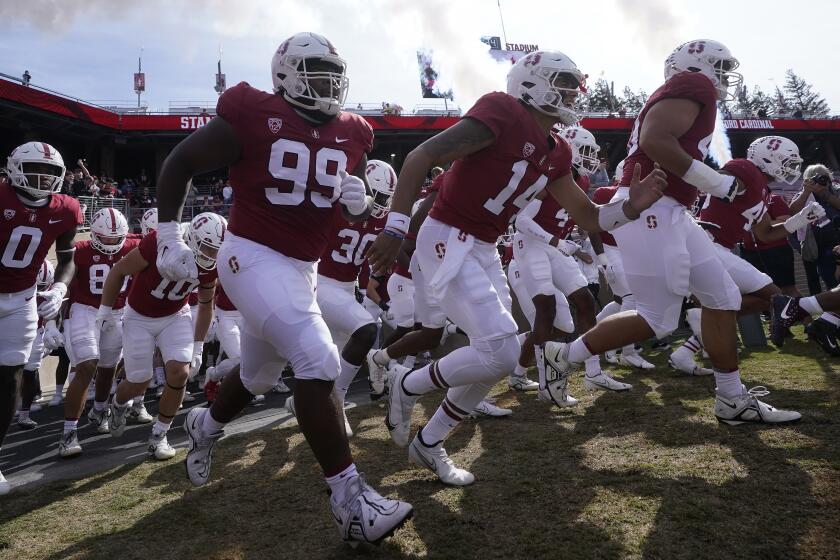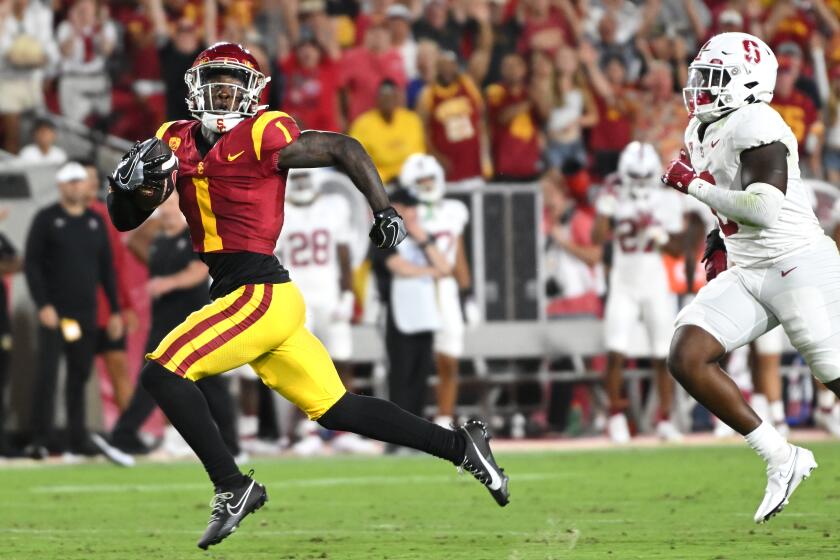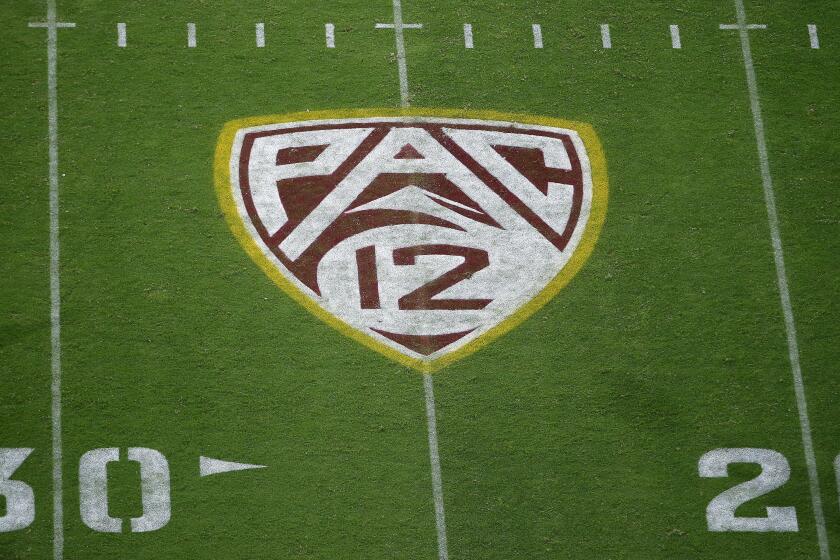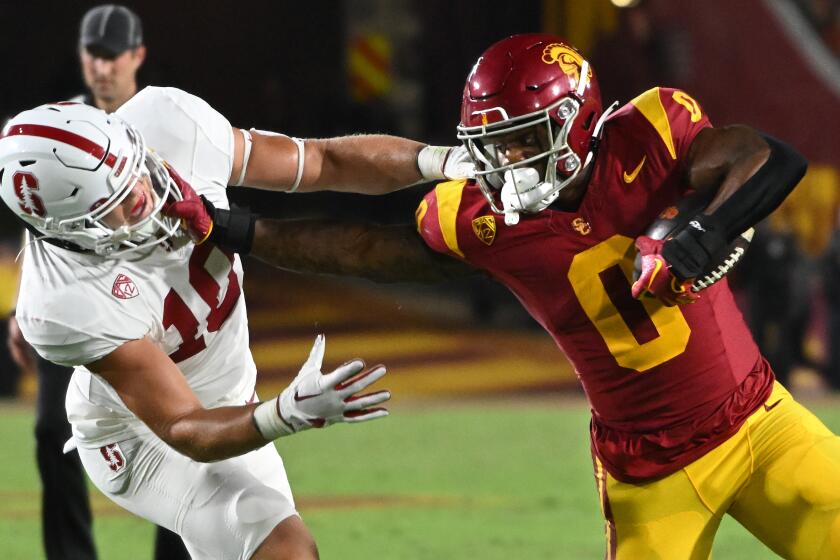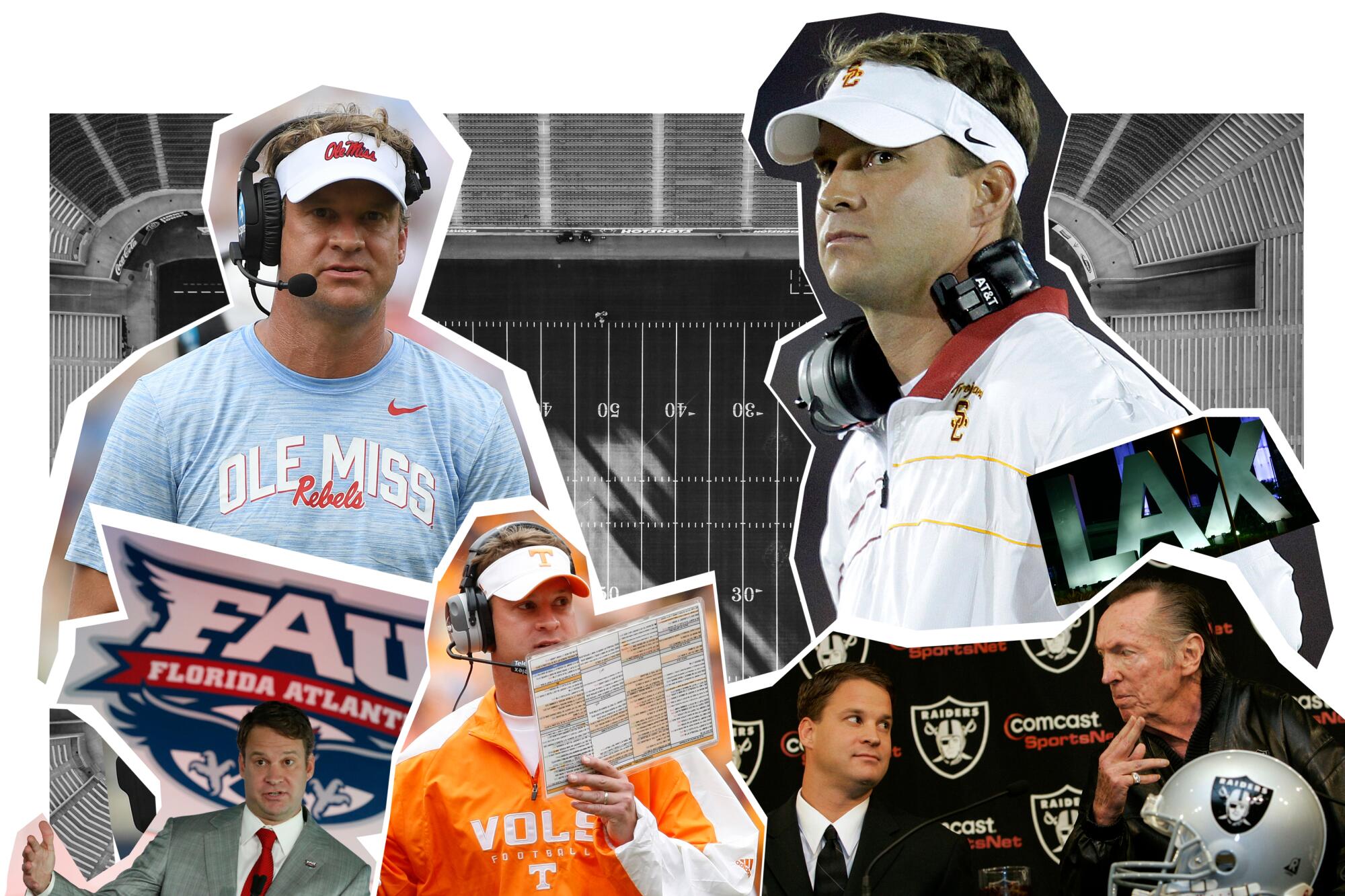
- Share via
OXFORD, Miss. — The first meeting of the summer session for the Mississippi coaching staff doesn’t start with football. Before they step into their roles as coordinators or assistants on this Wednesday morning in June, Lane Kiffin wants them to be fathers and husbands.
As they walk into the conference room, tall coffees in hand, the conversation revolves around their kids’ baseball games. Kiffin enters, followed by his young British lab, Juice, and quietly takes his seat.
Soon, a staff member guides Juice away, and the door closes. The meeting begins with a prayer.
“We’re going to talk about temptation,” says Fish Robinson, Kiffin’s pastor and a friend of the program. “I just pray we’ll be honest and real about where we’re at.”
A young man named Jared Farlow sits at the head of the table to lead today’s coaches devotion. He describes temptation as a “crack in the foundation that the enemy uses to make war with us, to get us off path.”
With Stanford and Cal moving to the ACC, university presidents continue to put the football money train ahead of what is in the best interest of students.
“Why is laying a strong foundation so important?” Farlow asks.
There’s a bit of silence, but Kiffin won’t allow it to get awkward.
“The house analogy of … get the foundation right, take your time, then the storms come, and issues come, you’ll have a chance,” Kiffin says in a low mumble.
Kiffin, 48, can speak with authority on this one. When the biggest storm of his life came out of nowhere 10 years ago, he had nothing firm to fall back on. “The Tarmac” remains an oft-used punchline for college football fans today, but for Kiffin, his 4 a.m. firing on the tarmac at LAX by USC athletic director Pat Haden was more than a public humiliation. It was acute trauma, shattering his self-image.
“Like Coach is saying about the house, you can build a massive, beautiful structure,” Robinson says, “but if the foundation is not healthy, it will crumble.”
Three months after this pensive moment with his staff, Kiffin’s freshly laid foundation is being tested. A storm of his own making is gathering, in the form of a lawsuit filed against Kiffin and Ole Miss by Rebels defensive tackle DeSanto Rollins. The suit alleges that Kiffin kicked Rollins off the team last spring for missing practices and refused to meet with him during what Rollins says was a mental-health crisis.
Rollins alleges that the Ole Miss staff did not supply him with mental-health materials after he became depressed dealing with injuries that kept him off the field last season. The lawsuit highlights a conversation Rollins legally recorded without Kiffin’s knowledge in March that paints a picture of a coach who had run out of patience for a player who could not function for the team amid his personal struggles.
Ole Miss released a statement to reporters Thursday night saying it had not received the lawsuit and declined to comment other than to say Rollins remains on scholarship and continues to have access to all sources available to Ole Miss athletes. Kiffin declined to comment, deferring to the statement.
But on this day, with his trusted team around him, Kiffin presents himself as a man who encourages empathy.
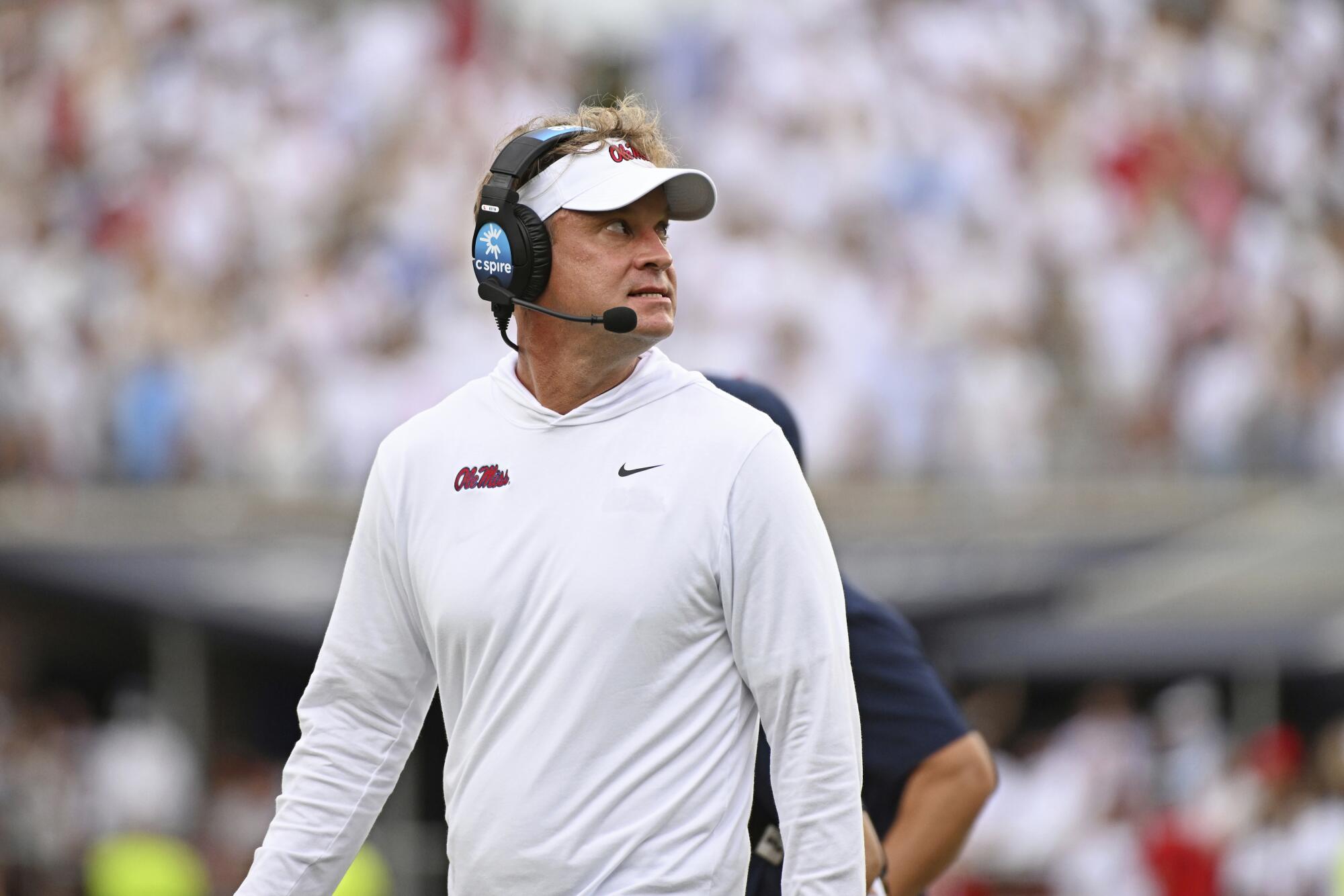
Farlow asks the coaches where they are seeking growth this year. One coach opens up about his struggle to maintain a healthy diet.
“I got kids and I want to last long,” he says.
Kiffin nods, pleased that someone else jumped in.
“It’s always about knowing your ‘why,’” Robinson says. “I don’t know a better why in the world than children. That’s the best why on the planet.”
That why was not enough for Kiffin during his days as USC’s coach. The Trojans trumped everything else. He has built a new life here in the heart of the deep South, where he’s gotten to live for the last year with the eldest of his three children, Landry, trying to make up for lost time. There’s a lot of serendipity tucked within that tale — a common theme in Kiffin’s journey — but he works hard to appreciate his good fortune these days. He believes he won’t squander it.
“Be alert, of sober mind, for your enemy, the devil, prowls around like a roaring lion, looking for someone to devour,” Farlow reads.
“So why do you think God allows the enemy to tempt us?”
“It would be too easy otherwise,” Kiffin says softly. “Everyone could do it. I like that visual — instead of the enemy tempts you, it prowls around, like a roaring lion, looking to devour. That’s actually more realistic than, like, tapping on your shoulder.”
For Kiffin, the temptation forever will be to bend to that persuasive old friend, the ego. It stalked him last winter. The open coaching job at Auburn — a place where it is proven you can win a national championship in the modern era — was calling him back to that familiar feeling that seeking success at the highest level is what will make him whole.
But Kiffin’s still at Ole Miss, isn’t he? Maybe this version of Kiffin, the Christian who doesn’t drink, the dutiful dad, the guy who says he loves simply being with his dog, will have real staying power.
“Why would God put a tree in the garden that would cause death?” Farlow asks.
“Because that’s what life is going to be like,” Kiffin says. “You can see it’s about discipline.”
The coaches devotion ends, and Kiffin makes the switch to football matters — but still no Xs and O’s. Later in the afternoon, the Rebels will come together for Kiffin’s “get real Wednesday,” where he divides the team into small groups so they can get to know each other better.
“They’re kids and we’re adults, but you watch Bible study today and we ask questions and nobody answers,” Kiffin says with a hint of derision. “We’re going to have to do a good job as a staff to create a vulnerable situation. You’re going to get out of this meeting what you put in. You have to make yourself vulnerable by telling your story first with them. Tell your story first.”
Kiffin is not going to ask his staff to do something he won’t do himself. Throughout the day, in five hours of conversation with a visitor, he will tell his story. He will make himself vulnerable. He will go back to a dark time he hasn’t visited for a decade.
Kiffin looks good, like a man who’s found his stride. He ably wears the frame of a professional tennis player, long and slender but not lean to the point that anyone should be concerned. His style matches, with socks pulled high for a retro vibe, shorts set mid-thigh showing off perfectly bronzed legs. His hair is wavy and golden brown, whipping every which way, begging to be boyishly brushed aside.
Ironically, Kiffin looks so good he should be coaching in Los Angeles.
Instead, he has tried to bring a little Manhattan Beach with him to this charming college town built around a historic town square. He recently purchased new steaming equipment for his favorite Oxford hot yoga joint, and he discovered the only chicken salad in town that can rival what he may find walking along the Strand with a view of the Pacific.
It took Kiffin years to get over his abrupt USC exit. He compares it to a friend who got divorced and wallowed in it.
“And they’re just miserable for six months, or a year or whatever,” Kiffin says. “That’s what I did.”
When Kiffin’s “get real Wednesday” is over, he will say that it was like therapy, rewatching the movie of his life in slow motion, reliving moments he had forgotten out of self-preservation. What’s clear is that this is a love story. Kiffin gave his whole self to USC, and it still broke his heart.
“I fell in love with every aspect of it,” Kiffin says. “Because you believe in it, and you saw it rise. I realized this is a goldmine. You can recruit to Los Angeles, California, fly these kids in from around the country, take them to have lobster at the beach. And it’s a private school. So the parents love it. So, yeah, I was in love with it.”
But he’d see the other side too.
“There are only two times in life that I haven’t wanted to wake up,” he says.
Both times, set nearly eight years apart, his wife, Layla, was there to console him. The first was the night after Texas shocked USC in the national championship game at the Rose Bowl in January 2006 while Kiffin was an up-and-coming Trojans assistant.
“I remember sitting in that hotel, people were hanging out, drinking, like, ‘Hey, we lost, but it’s still a great year’ and all that crap,” Kiffin says. “And I’m like, ‘Dude, we were one play away from three straight national championships and 35 straight wins.’ And I’m like, ‘It’s going to take forever just to get back here once.’”
Kiffin couldn’t take the denial from those around him and called it a night, confiding in Layla the depths of his despair.
“You woke up,” she told him the next morning. “You have a daughter. You’ll be all right.”
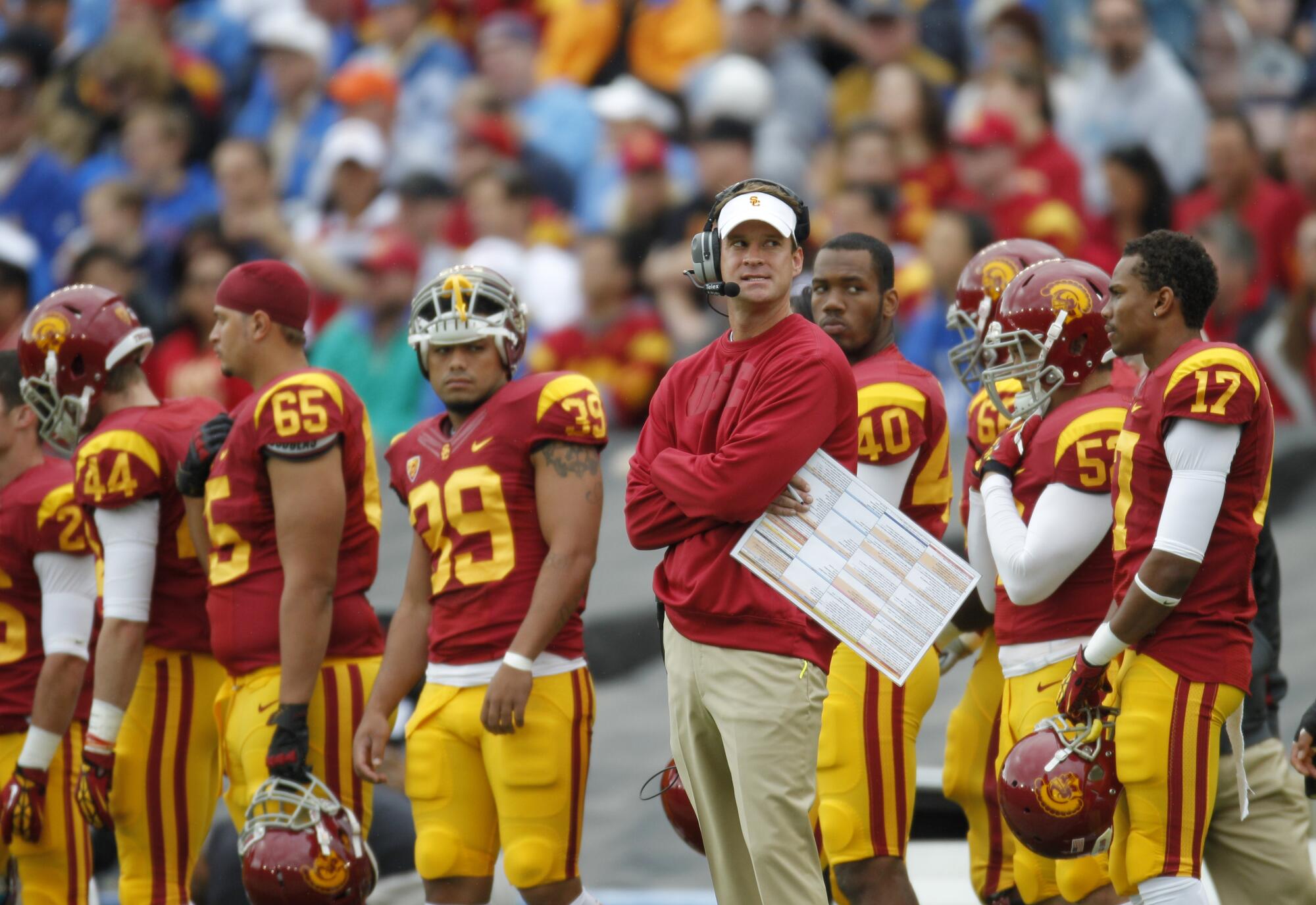
Kiffin was proven to be prophetic. USC would not return to the national championship game. And he wasn’t the type to wait around for the football gods to smile on the Trojans once again. His eyes stayed up, and soon he was the youngest head coach in NFL history at 32, leading the Oakland Raiders. It was a disaster, but that didn’t stop him, either.
“I look back and ask, ‘Where does your ego start to get really big?’ It’s Tennessee, it’s not Oakland,” Kiffin says. “The Raiders, you’re just working as a head coach in the NFL. Yeah, that brings some ego and power. When you become a head coach in the SEC, that is like a whole different level. Especially Tennessee.
“[My agent] Jimmy Sexton told me, ‘You’re the second-most recognizable person in this state.’ Dolly Parton is first. And you better be ready for that, because it’s powerful, and it can not just sneak up on you but kind of engulf you. Like I was saying in Bible study this morning with the prowling lion.”
Kiffin felt happy at Tennessee. But after one season as the Volunteers’ coach, he was walking through a hotel lobby when he saw news flash on the ticker that shook him:
Pete Carroll was leaving USC for the Seattle Seahawks.
“I don’t think it crossed my mind right away, like, I’d be the next coach of USC,” Kiffin says.
But within hours, Kiffin was on the phone with USC athletic director Mike Garrett’s right-hand man, Daryl Gross, who was asking Kiffin if he could bring assistant Ed Orgeron and his father, renowned defensive coordinator Monte Kiffin, with him from Tennessee to L.A.
“This probably doesn’t sound good, but because of knowing me there was no in-person interview,” Kiffin says. “I just had one phone call with Mike and then he put me on a call with the president and one other person for like five minutes.”
Kiffin recalls that the other person was USC’s compliance director, who along with school leaders assured him that the oncoming NCAA sanctions against the program following the Reggie Bush scandal would amount to “one or two scholarships, a slap on the wrist.” Even if they had said the NCAA was going to decimate the program, it wouldn’t have paused Kiffin, who was raised in the profession by the ever-positive Carroll to believe there was always a way.
While Kiffin was freshly smitten with his dream school, Garrett told him that he would offer him only the salary he was making at Tennessee and not a cent more.
USC has dominated its first three games, but the cakewalk is over. The surprisingly potent Pac-12 will test whether the Trojans are playoff worthy.
“I went from the cost of living in Tennessee to the same exact salary in Los Angeles. You think Lincoln [Riley] is making the same salary he made at Oklahoma?” Kiffin said, referencing the current USC coach.
“But I didn’t care. I would have done it for half. I would have walked there. And I left a premier job I was enjoying.”
The Tennessee fan base became enraged at the slight and set Knoxville’s La-Z-Boy population ablaze. To get Kiffin and his young family out of there, Garrett offered them first-class airfare to L.A.
“I’m like, ‘Can you explain to them that we are in Knoxville, Tenn., where they’re burning things?’ ” Kiffin says. “You think me and my family are gonna roll into Knoxville airport?”
So, USC sent a jet for Kiffin. Neither side, fresh off rekindling their flame and consummating a marriage forged in the fires of mutual arrogance, could have foreseen the turbulence to come.
Five months later, in June 2010, the NCAA levied sanctions against USC. It was not a slap on the wrist. It was not one or two scholarships. It was 30 over three years. Lane Kiffin did the math, and no amount of Carroll‘s magical thinking could hide the truth.
To Kiffin, if the penalty started immediately and limited his first full recruiting class, it was akin to a death penalty. Kiffin saw one path to giving the program a chance to survive, and that was appealing the NCAA ruling, delaying the onset of penalties so he could complete the 2011 recruiting class and stock talent before the purge.
But nobody at the university would listen. He asked around and was given the name of a USC alum who carried a lot of influence and possibly could help the cause.
“That person,” Kiffin reveals, “is Pat Haden.”
Kiffin broke it down for Haden, the former USC quarterback and Rhodes Scholar.
“All of a sudden, they let us appeal it,” Kiffin says.
Not even two months would pass before Garrett was out and Haden was in as USC’s athletic director, hired to repair the Trojans’ image and support Kiffin through a period unlike any other in USC football history.
On Haden’s first day, he met with Kiffin and laid out his expectations clearly.
“We know there’s going to be four- or five-win seasons. We know the Coliseum is going to be half-empty,” Kiffin recalls Haden saying. “We’re prepared for all that. Get us through probation. Don’t even give a recruit a bottle of water. We need you to do things right.”
In 2010, USC’s first of two seasons with a postseason ban and sanctions looming over it, the Trojans went 8-5.
USC lost the NCAA appeal, but the process gave Kiffin the time to sign a 29-player recruiting class ranked in the top five nationally. And in 2011, the Trojans broke through on the field with a 10-2 season, finishing with a win at No. 4 Oregon and a 50-0 beatdown of UCLA.
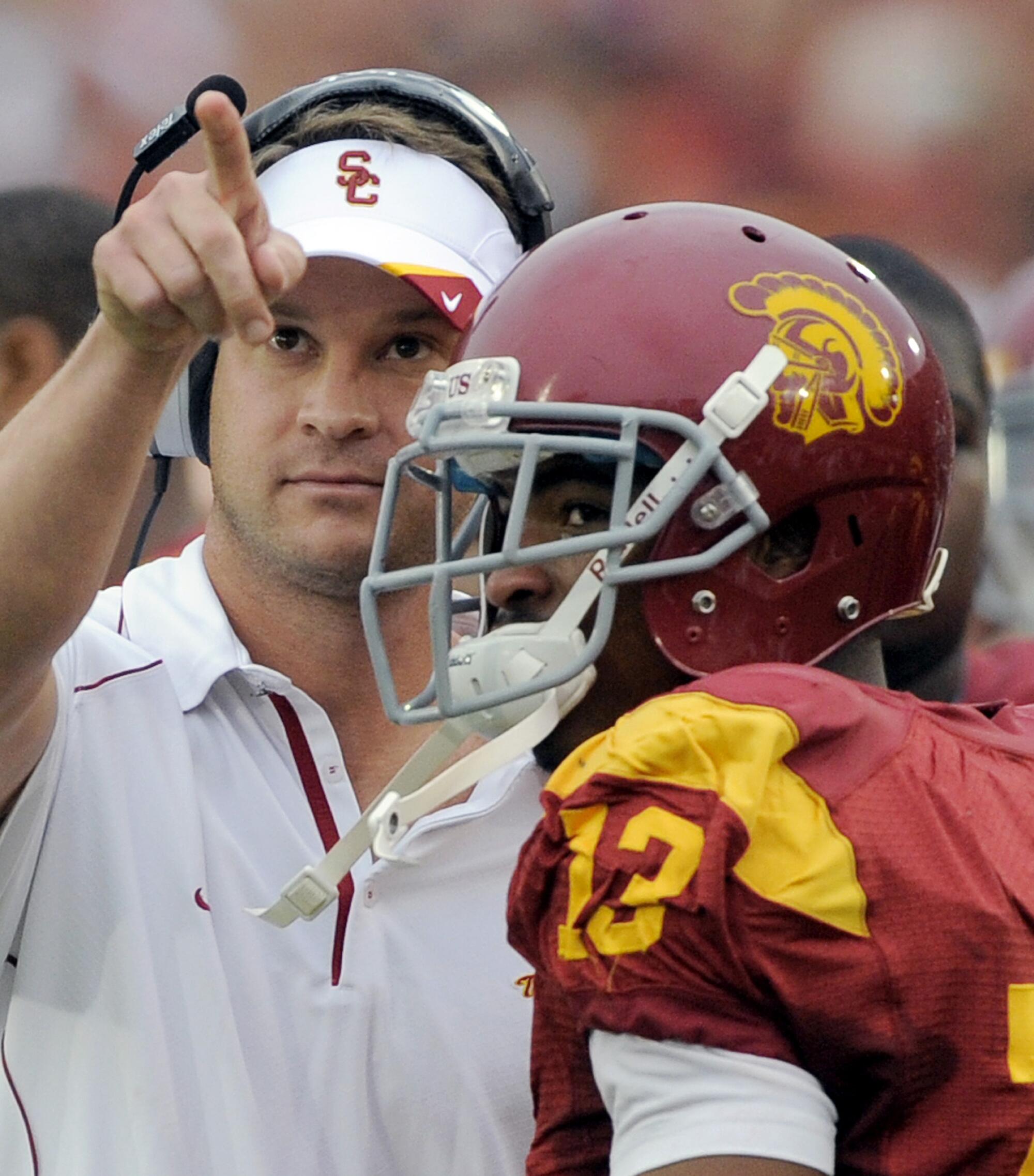
“Those penalties were like a dark cloud, and the sky cracked open with the 10-2 season,” Kiffin says.
In 2012, Kiffin’s first season with no bowl ban, the clouds were supposed to break for good. Star quarterback Matt Barkley was returning for his senior year, and the media voted the Trojans No. 1 entering the season.
Even though Kiffin knew the reality of his roster with the scholarship reductions kicking in, he fed into the hype.
“I talked to Coach Carroll, and he’s like, ‘Man, you should embrace this, have fun with it,’” Kiffin says. “Those rankings mean absolutely nothing, but I went with it. We’re acting like ‘SC’s back.”
The Trojans started 6-1 before falling at Arizona and losing five of their last six. USC’s first bowl trip in three years would be to El Paso, Texas, for the Sun Bowl, where the Trojans looked like they didn’t want to be there in a 21-7 loss to Georgia Tech. The darkness was back, stretching from El Paso to L.A.
Haden called Kiffin the next morning.
“He goes, ‘I don’t know what to do. This is the worst I have ever seen the USC football program,’ ” Kiffin recalls. “He wasn’t saying in his two years as A.D. He was saying in his lifetime. So maybe I should have known something more by that call. Because I am thinking, ‘Hey, we still had that conversation about how these days were coming.’”
There were other signs Kiffin could have noted, like how late in the 2012 season, Haden started meeting with him every Sunday, or how Haden was having individual meetings with players. But Kiffin did not sense his employment was in jeopardy entering 2013.
“I fired my dad,” Kiffin says. “So I think that shows my passion for USC football being good above everything else. USC winning was by far the thing I cared most about in my life, and I’m not proud to say that at all. I spent 1,000-to-1 energy and time on USC football, not my children or my wife. I’d go in Sunday and come home Thursday night, just stay there.”
Early on the morning of Sept. 29, 2013, that’s where Kiffin thought he was headed when the Trojans landed at LAX after a tough loss at Arizona State — back to campus with his team.
But assistant athletic director J.K. McKay asked Kiffin to get off the idling bus.
Now, to the second time Kiffin did not want to wake up.
“I kind of pride myself on not being naive,” Kiffin says, “but even when J.K. said ‘We need you to come off the bus,’ I still didn’t know.”
Earlier that night in the locker room, Kiffin had talked to Haden as he normally would about the state of the roster, how they had one healthy scholarship wide receiver heading in to the bye week, and Haden hadn’t said anything.
The Trojans were just 3-2, and they were 28-15 since Kiffin took over under the worst of circumstances. But here he was, walking into a small, private airport at LAX where Haden was waiting for him.
“There’s this little coffee area with one table. I’ve gone back to that airport probably five to 10 times, which is eerie,” Kiffin says. “And he tells me [I’m fired] and I’m like, ‘What, are you serious? What is the point now?’
“And I actually get kind of desperate because I wanted to be the coach so bad. I don’t even care if you announce it. Announce that ‘at the end of the year, he’s gone.’ But why are you doing it? I haven’t heard of someone getting fired at 3-2 with no sanctions.
“And he was listening. It was resonating, like, ‘Oh yes, that’s right, I know we’re not supposed to be any good.’ And he twice leaves to call somebody.”
With Stanford and California joining USC, UCLA and six other schools in fleeing the Pac-12, the one-time power conference could be no more by next year.
Each time, Haden, who did not respond to multiple requests to speak to The Times, said, as Kiffin recalls it, “I can’t change it. It’s already done. They won’t take it back. They’ve already told too many people.”
“It was his way of saying it was out of his hands, this came from above me,” Kiffin says.
Rick Carr, USC’s longtime head of security, drove Kiffin back to his home, where his wife and three kids were sleeping peacefully. Kiffin woke Layla and told her it was over.
“She doesn’t help, because she knows Pat and I were close, like come-over-to-the-house close, go-to-dinner-with-his-kids-at-his-request close,” Kiffin says. “She knows that he knew the sanctions and the numbers. She’s like, ‘There’s no way.’
“It’s probably 4 or 5 a.m. at this point, and I’m in the backyard, sitting with Layla, and I’m like, ‘I don’t want to wake up.’ Like, my life’s over. That was my dream job. I mean, why wake up? She’s just like, ‘What’s wrong with you? You have three kids asleep upstairs.’ But that’s how f’ed up I was. Because that job was my higher power.”
A late September firing felt like cruel and unusual punishment to Kiffin. He couldn’t just quickly move on to the next job. He had to bathe in the embarrassment for weeks on end.
“You feel like everyone’s looking at you,” he says. “I remember going to a bowling alley at L.A. Live, and I just stopped, and Layla is like, ‘What’s the matter?’ And I’m like, ‘I’m a loser. They’re all like “There’s that loser coach that got fired.”’ That’s not a good way to live. But that’s how I felt.”
His struggle to return to the public eye was one thing, but Layla thought the firing could be turned into a positive at home. They actually had time with him for once.
“At one point she sat me down and said, ‘You should be using this time as family time with your kids and maximizing this time,’ ” Kiffin says. “I wasn’t listening to that. I was too about me. I don’t want to be in a good mood and go have fun. I just got my life ripped away from me. So I sat in that pity party for months. I was miserable to be around, just angry and resentful and did not use that time at all like I should have.”
Finally, after more than three months, Alabama coach Nick Saban pulled Kiffin out of his stupor by offering him the offensive coordinator job.
Kiffin was off to Tuscaloosa. The plan at first was for the family to come with him. But they never did, leading to the end of his marriage.
One Sunday in the spring of 2021, Robinson had to do a double-take.
“My son walks up to me and says, ‘Hey dad, Lane Kiffin was at church,’ and I start laughing, like, ‘whatever son,’” says Robinson, the pastor at Community Church Oxford. “And our student pastor walks up to me and says, ‘No, he was!’
“I’m like, ‘That’s great. Lane Kiffin needs Jesus, too.’ ”
Kiffin’s appearance that day didn’t come out of nowhere. After his personal and professional lives hit rock bottom, he’d been searching for answers to life’s big questions. The first book that struck him was “The Obstacle Is the Way” by Ryan Holiday.
“I can look at the USC thing and say, ‘OK, the obstacle is the way,’ ” Kiffin says. “And then I just say, I never would have worked for Nick Saban. And I don’t believe I would have gotten grounded, because that’s very humbling.”
Kiffin read Christian author Rick Warren’s book, “The Purpose Driven Life.” The first words of the book? “It’s not about you.” That one hit home too.
If Kiffin hadn’t been humbled, he wouldn’t have taken the coaching job at Florida Atlantic. During his time in South Florida, Kiffin received a surprise visit from motivational author Jon Gordon, who speaks on leading through faith.
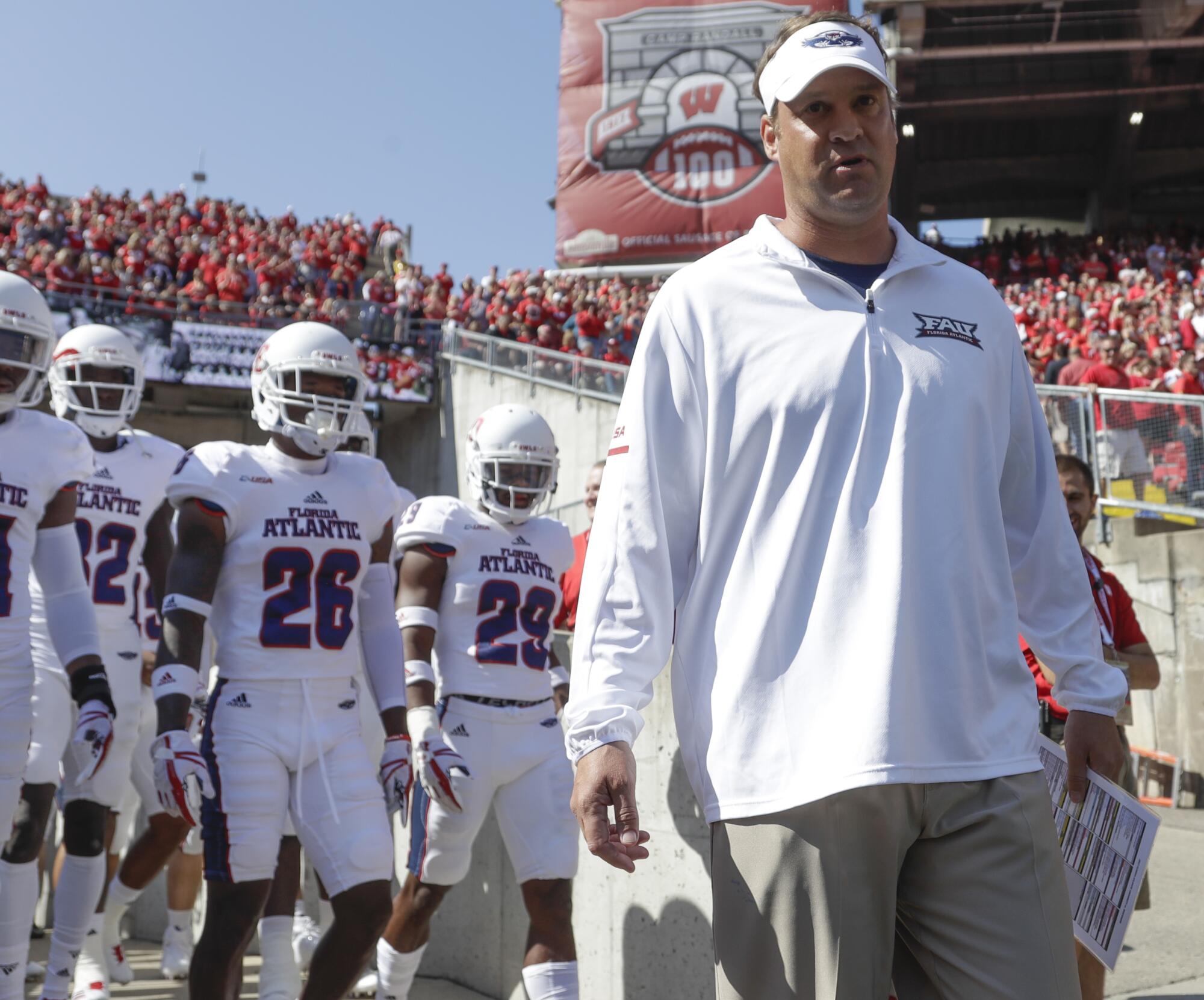
“He drives down from Jacksonville and shows up at my office and says, ‘God told me to come visit with you,’ ” Kiffin says. “That was a God moment. Like why is Jon Gordon the writer coming to see me? There were just a lot of little God things that happened.”
In the midst of that wave of change, Kiffin was enticed by a chance to return to the Southeastern Conference as coach at Ole Miss. At first, he missed his home by the water in Boca Raton and his kids in L.A. The small-town life, everybody wanting a moment of his time, didn’t really suit his personality, but being a coach in the SEC at least honored his gifts.
With his first season swallowed up by the pandemic, he had plenty of time alone to take stock of himself.
“At FAU I got out of shape, and here it got bad,” Kiffin says. “I was heavy. I looked at a picture of me with the COVID mask, but I can see my neck. It looks like an anaconda swallowed an animal and it’s stuck in their neck. I’m like, this is embarrassing. And my blood pressure numbers had been up a couple years with the stress of the job, but I wasn’t helping it with diet and alcohol.”
Kiffin started a cleanse. No red meat, no bread, no alcohol.
“The first two are hard. The last one is really hard,” Kiffin says. “By Day 10, I was obsessed with it. I feel so much better. And I have never gone back on that. Now at times I’ve messed around and have some bread or whatever, but I really stopped with the alcohol thing. And I’m not saying I’m this national spokesperson for it, but I will talk to our coaches because it makes a lot of sense.
“It doesn’t help me be a better coach, a better parent, a better friend. Not that it’s destroying these relationships, but it’s not helping. And now I look back and go, ‘Why wasn’t I doing this all along?’ I’m not saying if I wouldn’t have drank I would still be the head coach at USC. But I would have dealt with it better. I can certainly say my drinking did not decrease after the firing, when there’s no work to go to.”
USC coach Lincoln Riley and Heisman favorite Caleb Williams have gotten off to a hot start, but bigger tests loom in the potent Pac-12.
It’s no coincidence that Kiffin began to clean himself up when a window opened to become closer to his eldest daughter.
Landry Kiffin spent her first 17 years trying to make it work as an L.A. girl, but her transition to Southern belle has been a natural one. She loved the simple Oxford life so much on her visits that during a junior year spring break trip, she decided she wanted to stay for good.
It didn’t hurt that she’d figured out she had a dad who was ready to abandon all his past parenting principles and say yes to everything.
It was boring in the house, so she wanted a dog. Kiffin made a call to Wildrose Kennels, a renowned breeder of hunting dogs nearby, and later that day, they had Juice, who’s now the unofficial Ole Miss football mascot.
Landry made close friends quickly, and the group of teenage girls basically took Lane in. He hosted them on a trip to the Bahamas, and every Thursday night after Kiffin’s radio show, they go watch a movie together. The girls call him “Sparky” because he kept suggesting those sappy, romantic films from the Nicholas Sparks books.
Landry says her father is different today.
“Definitely a lot more positive,” she says. “And, like, more of a parent now. We have a better relationship than we did before, not living together.”
A typical teen, Landry wasn’t going to go much further than that with her dad sitting right there. But her actions spoke louder than words when the Auburn job opened late last fall.
The opportunity to move up in his profession summoned Old Lane out of hibernation, and Landry could see it happening again.
She and her friends put together a slideshow reminding him of all the fun they’ve had, begging him to not upend it. They put the deck on a projector in the Ole Miss conference room. Lane teared up watching it.
But as the days passed without Kiffin making a public decision, Landry would apply extra pressure. After all, she was in the process of deciding she wanted to attend Ole Miss for college.
Kiffin remembers her saying, “I would understand if you’d been a coach your whole life and you’ve been chasing the big job and never had it and this was your one shot. But you’ve had that before. So what’s more important? When you had me, you gave up the right to always make choices for yourself.”
“That was pretty mature of her,” Kiffin says, “because I did make choices for myself. I didn’t think about what was best for the kids. So when she said that, it really hit me. How could I hear that and then tell her, ‘No, I’m going to go.’ ”
With Landry here, Oxford is beginning to feel more like home, not just a place he happens to live while doing his job. She’s just begun her undergraduate experience at Ole Miss, so in the coming years, it likely would take a once-in-a-lifetime career opportunity to lure Kiffin away.

“Oxford isn’t what he expected, and Lane isn’t what we expected,” Robinson says. “I think the biggest change I’ve seen in Lane Kiffin is that people are not just opportunities. People are not just chess pieces. They’re living and breathing. They have hearts, and the guy actually cares.”
Says Kiffin, “I’m more now into being defined as a really good person who treats people really well and a really good dad and coworker and friend. I don’t want a statue, to win more games than anybody else has. That kind of fits in line with Mississippi versus L.A., what I was caring about before. I would not have told you that what I needed is moving to Oxford, Miss., but that was exactly what I needed.”
After hearing all of this and witnessing Kiffin open up about the changes he’s tried to make since USC, the news of Robbins’ lawsuit against Kiffin hits with an extra jolt.
Haden used to call Kiffin “Teflon Lane” because he always seemed to bring bad headlines yet escape them masterfully. Well, now controversy has followed Kiffin to sweet, serene Oxford — proof that you can trade the big city for a slice of Southern charm, but you can’t evade the intense pressure of coaching in the SEC, where it truly “just means more,” as they say.
Where do college football fans gather to watch games in Southern California? From Ohio State and Clemson to USC, use our guide to find your game-day spot.
You can’t expect Kiffin to be a saint but also take down Saban, a feat he’ll be trying to accomplish this week as Ole Miss travels to Tuscaloosa on Saturday for a season-defining game.
Kiffin will lead the Rebels with dark questions looming over the man and his program. Robbins’ ugly allegations that he was yelled at, cursed at, belittled and dismissed by Kiffin while taking a “mental-health break” come mere months after Ole Miss announced in late June that its entire coaching staff had been “mental-health first-aid certified.”
Kiffin will have to remain silent as the situation plays out in court. Nothing could be more challenging for Kiffin, who is accustomed to using his quick wit and relatable humor to disarm his critics and redirect the public discourse around him.
Can he really stay quiet while his reputation takes a hit? The one thing we know for sure with Kiffin is that the college football world will be watching, waiting to seize on any crack in his foundation.
More to Read
Go beyond the scoreboard
Get the latest on L.A.'s teams in the daily Sports Report newsletter.
You may occasionally receive promotional content from the Los Angeles Times.

